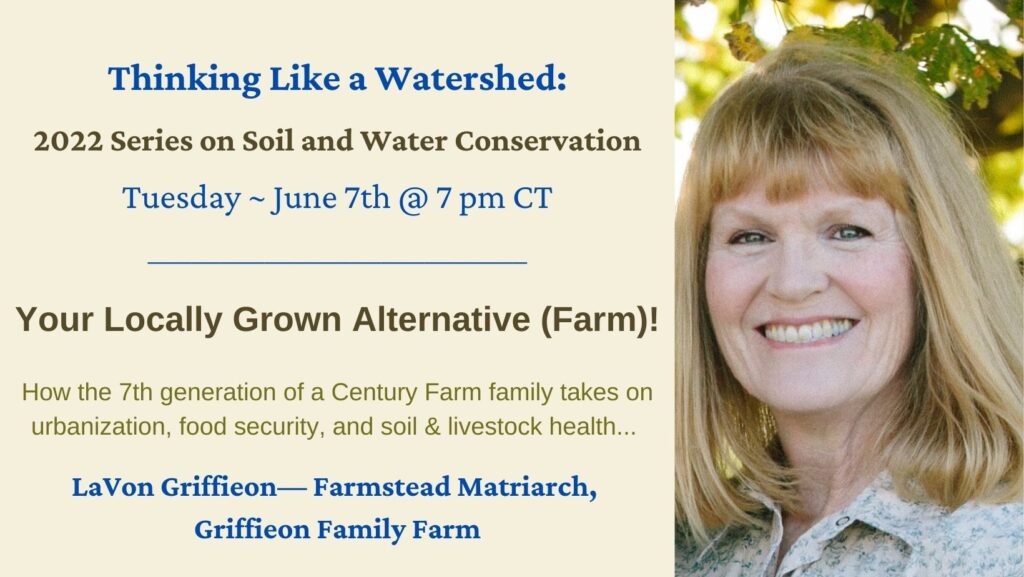On land, In Streams!

Volunteers meet at Squirrel Hollow’s boat ramp on the Raccoon River…featuring UMRI’s Mike Delaney, Panora Conservation Chapter member, Bob Rye, Fred Long, President of the Iowa Conservation Alliance, and Mike Murphy, Raccoon River Watershed Association. Photo by: Curtis Cokeley
It’s worth repeating…Save Our Streams
Volunteering with a REAL purpose!
The team of retired land stewards volunteer to monitor streams in Greene County. June samples were collected for the ongoing monthly “chemical” data gathered from the tributary streams that flow into the Raccoon River near Squirrel Hollow. Like many of our waterways, this particular area continues to be threatened by agricultural runoff from a number of sources. As mentioned in past website updates, a new confined animal feeding operation for young pigs is now in the works, and there is great potential for the pig manure to end up in the already overburdened waterways. In efforts to bring awareness to the local community and beyond, a collective group of concerned neighbors got together and formed a “Save Squirrel Hollow” campaign.
The SOS (Save Our Streams) program is a perfect example of water monitoring with a purpose. The data collected is entered into the Izaak Walton League’s national clean water hub. You can also go to NRCS and check the temp, volume and nitrate any time.

The tributaries “location/coordinates” are collected at each stream site, they all flow into the Raccoon River near Squirrel Hollow Park, Photo by: Curtis Cokeley

This is an example of documented photos collected at each tributary “upstream” site from where water samples are collected for chemical analysis. Photo by: Curtis Cokeley

This is an example of documented photos collected at each tributary “downstream” site from where water samples are collected for chemical analysis. Photo by: Curtis Cokeley

This image is screenshot from Izaak Walton League’s Clean Water Hub. It includes both May & June 2022 data sets of the results from basic chemical tests from the Raccoon River at Squirrel Hollow. To learn more about the chemical part of the SOS monitoring click here!
Summer Stream Fun—

SOS training attendees. Photo by: Christine Curry
An unnamed tributary of the North Walnut Creek near Rocklyn Park in Urbandale was the perfect spot for the SOS training Saturday, June 17th with Susan Heathcote. The trees along the creek banks and the cool stream provided a comfortable environment on this sunny warm Saturday morning.

Field instructions with Trainer Susan Heathcote. Photo by: Christine Curry

Measuring stream width. Photo by: Christine Curry

Stream bank field observation of Yellow Oyster Mushrooms (Pleurotus citrinopileatus). Photo by: Christine Curry

Observing and counting creek critters. Photo by: Christine Curry
Conservation Journal Award—
The Soil and Water Conservation Society Board of Directors has just announced its recipient of the 2022 Editor’s Choice Award and an article co-written by UMRI’s Caroline van Schaik. The piece argues for managed grazing as a critical and appropriate tool for reinvigorating the landscape in the face of degenerative farmland practices that have eroded farm wealth and natural resources. It offers recommendations for policy, technical, and related changes to see this to fruition. “Accelerating regenerative grazing to tackle farm, environmental, and societal challenges in the upper Midwest” was recognized as “an article of excellence appearing in the A Section of the Journal of Soil and Water Conservation in the previous year.” It can be found here.
Staff at the Wallace Center in collaboration with the Midwest Perennial Forage Working Group led the writing effort. UMRI Driftless Coordinator Caroline van Schaik is a member of the working group. Author information is here.
from the CONCLUSION
“Regenerative agriculture and grazing can help solve some of the UMRB’s most urgent challenges: the devastations of a shifting climate, poor water quality, rural community contraction, racial inequities, the financial struggle of the farm next door, and declining soil health. Yet as encompassing of environmental and societal problem solving as they are, the benefits of regenerative grazing continue to be undervalued and under-incentivized by actors ranging from federal and state governments to lenders, private sector agribusinesses, and universities. Expanding the use of regenerative practices requires a cross-cutting shift in how we think about agriculture and society (figure 3). Increased financial resilience coupled with comprehensive TA (including production and financial management) provide a foundation for additional interventions that will expand the adoption of regenerative grazing. Multifaceted systems change must be premised on a full grasp of the value of regenerative grazing in order to improve policy support, expand land access, provide supply chain supports, create flexible lending, reduce production risk, and fully reward the plethora of services provided on and beyond the farm. Further, dedicated centering of racial equity and labor justice along with targeted access to land, capital, TA, and other resources for BIPOC farmers will be crucial to ensuring this agricultural movement does not perpetuate the harms of previous movements. A future characterized by a stable climate, resilient agro-ecosystems, thriving farms, and diverse, just communities throughout the UMRB is possible. Evidence indicates that significantly expanded adoption of regenerative grazing provides a path toward that future.”
Celebrating Farmland Stewardship—
Neighbors, friends, landowners, farmers and several partners and members representing many conservation organizations gathered at Practical Farmers of Iowa’s Field Day: Farmland Owner Legacy Award Celebration at Panora Conservation Chapter member, Chris Henning’s farm June 24th, 2022. The beautiful evening was just a perfect picture opportunity for those who gathered for the farm tour and celebration topped with a fabulous dinner that included local pasture raised hamburgers and homemade rhubarb and apple pies.

Chris points out prairie features that benefit the entire landscape of soil, water and crops. Photo by: Christine Curry

Common Milkweed is a common find on Prairie Skye Productions Farm. Photo by: Christine Curry

Chris discusses the meaning of farmland stewardship and how she collaborates with her farm tenants and more while receiving her award. Photo by: Christine Curry

No matter how you slice it, it’s all about sharing farm fresh homemade rhubarb pie from your good neighbor. Photo by: Christine Curry

There is nothing like enjoying the summer breeze with great conversations and fresh local food on the farm. Photo by: Christine Curry
And Landowners—
The case for engaging working farmland owners who themselves are not making hay or moving fence gets another UMRI take in the next several months, likely starting in Greene Co., Iowa. UMRI staff expect to join forces with a group of women charged with speaking out about what are called non-operating landowner possibilities. Our shared goal is to put conservation to work even when they themselves are not working their farms. And more to the point, to help landowners realize there is work they can do, what it might look like, and why they play a critical role in such issues as erosion control, the dramatic shifts in climate, challenged wildlife habitat, and safe water. Stay tuned for events; they are going to be good. Please contact Caroline van Schaik or Christine Curry as needed.
And for a take specifically on the power and role of women landowners, here’s a new piece by some of the nation’s leaders (including Iowa’s Dr. Jean Eells) in understanding this segment of non-operating landowners.
2022 Thinking Like a Watershed programs—
UMRI’s “Thinking Like a Watershed” series has gone fishin’!
Not wishing to compete with long summer days – and who would want to! – we hosted our final 2022 “Thinking Like a Watershed” episode on June 7th. Go outside! We will see you in January for stories to inspire a winter’s night, as told by ourselves and good partners on this road to a better landscape.
The linked recording of the June 7th presentation – by the head of a 7th generation farm creatively grappling with urban sprawl – is below, as are links to all past programs. Take a listen, take some hope, and let us know if you would like us to consider a certain someone or topic in programs to come. And if you are new to the series, we use these words to describe what shapes it: This monthly series is a project of the Upper Mississippi River Initiative (UMRI) of the Izaak Walton League of America, with co-hosts Chris Henning of the Panora Conservation Chapter and Des Moines Chapter Communication Director, Bud Hartley. We feature guests for 30-40 minute presentations that shed daylight on good works done in the name of the Mississippi and its uplands. In this way we uplift our shared goals for a cleaner river, a cared for environment, and kinder communities. Recorded programs are available shortly after they air live.
“Your Locally Grown Alternative (Farm!)” with a conversation with LaVon Griffieon on, “How the seventh generation of a century farm family takes on urbanization, food security, and soil and livestock health.”
Farmstead matriarch, LaVon shares her story about how they have created special niche markets on their 7th generation family farm. She weighs in on the good, the bad and the ups, and the downs of keeping their family farm relevant as rural landscapes around them continue to turn into suburban developments. During this transformation, hundreds of acres of our agriculture’s best top soil disappears, as does the rural land that has potential to grow real food in Iowa and reduce 90% of imported foods..
To learn more about the Griffieon’s farm click here!
If you’re interested in learning more about the Power of Data, you’ll want to watch the recording of our May 3rd Thinking Like a Watershed program: “Stream TEAM Science is (slowly) shifting policy”— a conversation with leaders Larry Dolphin, Bill Buckley, Mark Owens, lifelong members of the Izaak Walton League (IWLA), and Josh Balk, Iowa Department of Natural Resources (DNR) on How E. coli and DNA data changed Mower Co. septic system practices. This is a perfect example of how citizens’ science water monitoring with a purpose has worked to build relationships and positive change to improve water quality in a watershed filled with concentrated animal feeding operations and people.
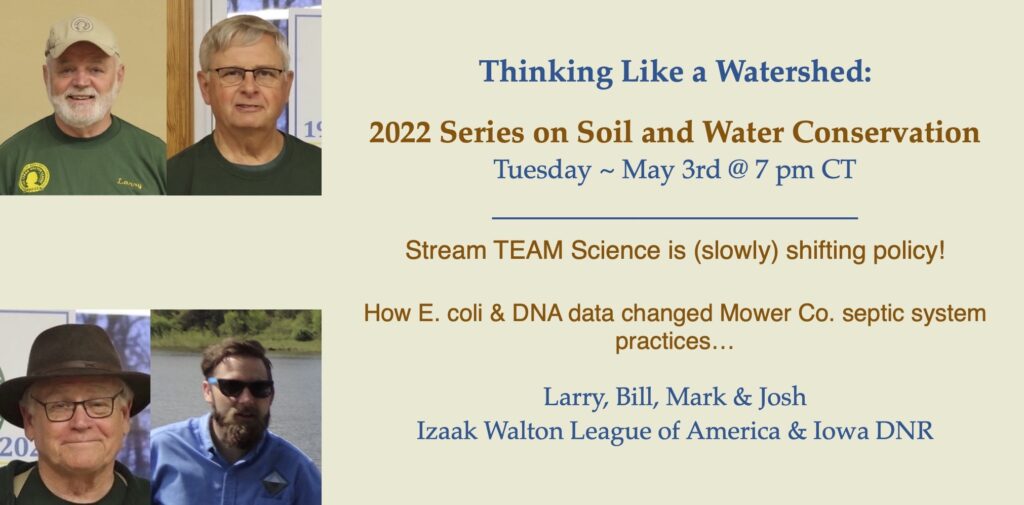
If you missed our April presentation, here is the link: The 2023 Farm Bill after 100 Years of Conservation! with Duane Hovorka, Agriculture Program Director, Izaak Walton League of America
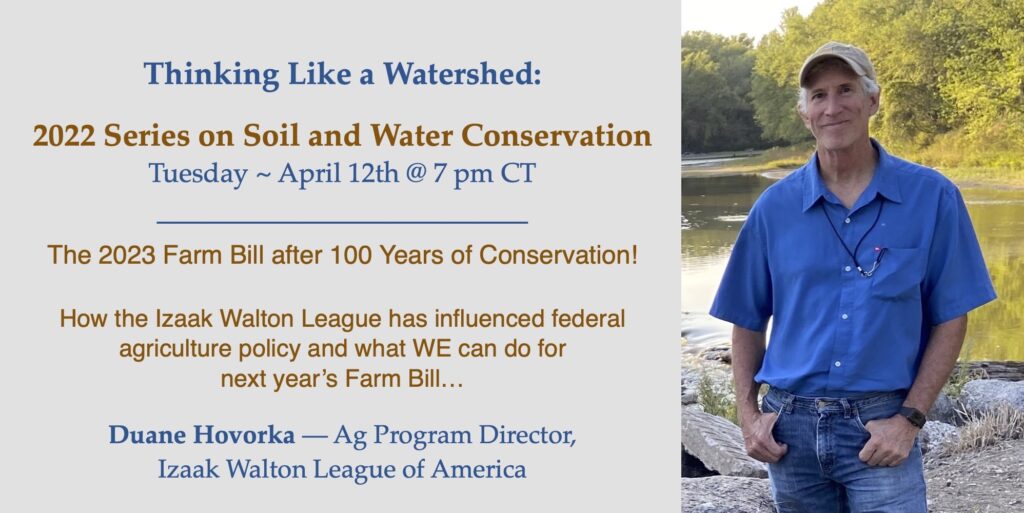
The League played an instrumental role in “groundbreaking environmental victories” during the past 100 years. Duane highlights some of those accomplishments, such as the creation of the Soil Bank in 1956, the Clean Water Act in 1972, the Conservation Reserve Program in 1985, and the Conservation Stewardship Program in 2002.
Duane summarized the 2023 Farm Bill suggestions he’s heard during winter listening sessions. He shares some of the best ideas that others have been sharing to help the Izaak Walton League prioritize solutions.
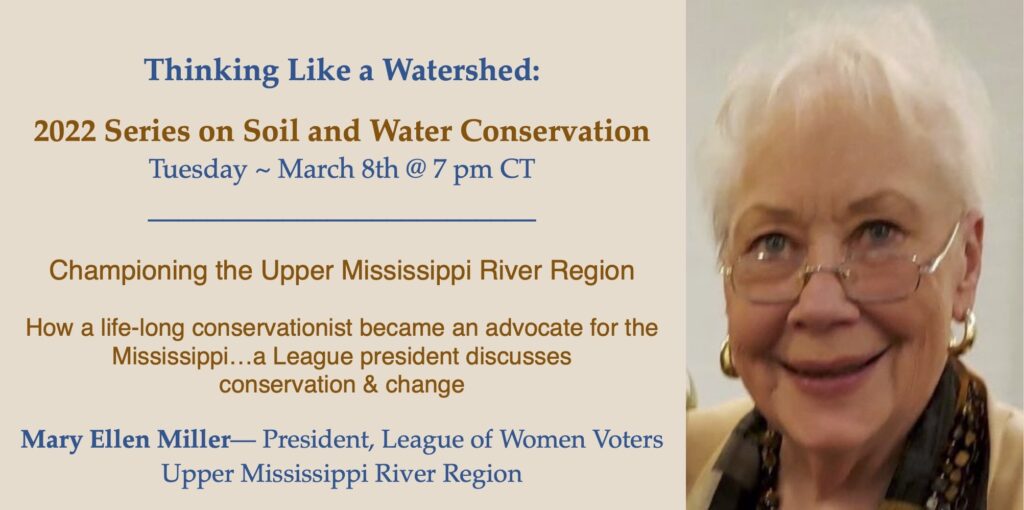
— “Championing the Upper Mississippi River Region” Thinking Like a Watershed ~ Mary Ellen Miller— March 8th, 2022 How a life-long conservationist became an advocate for the Mississippi…a League president discusses conservation & change with Mary Ellen Miller, President, League of Women Voters Upper Mississippi River Region
Our February program featured Kelly McGinnis the executive director of the Mississippi River Network which includes 58 organizations including the Izaak Walton League and several of our UMRI partners.
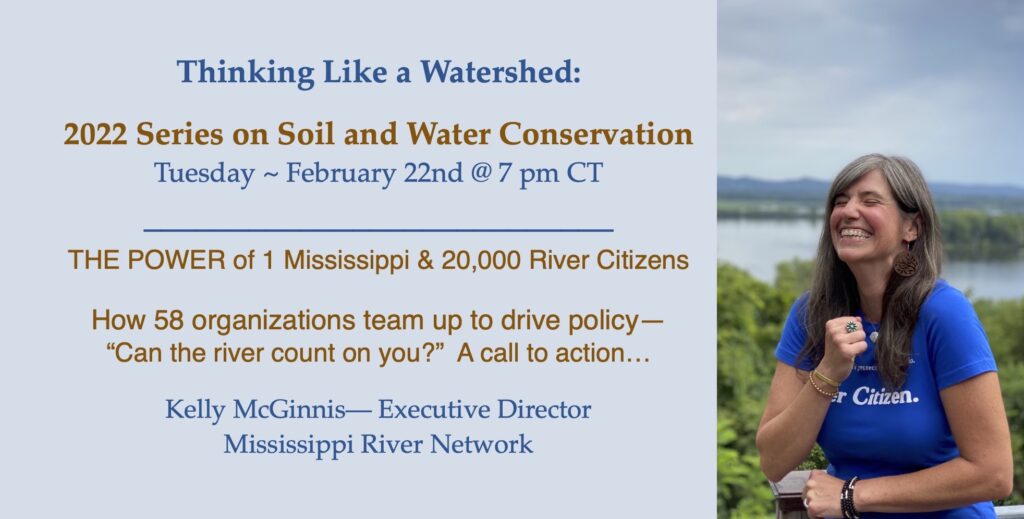
—“The POWER of 1 Mississippi & 20,000 River Citizens” Thinking Like a Watershed ~ Kelly McGinnis— February 22nd, 2022 How 58 organizations team up to drive policy—“Can the river count on you?” A call to action…
Kelly shared the power of the Mississippi River Network’s (MRN) use of public outreach and policy advocacy such as the Mississippi River Restoration and Resilience Initiative Act. You’ll find out about the activities of the network, a coalition of 58 organizations dedicated to creating a healthier Mississippi River by working for the well-being of the people, land, water, and wildlife of America’s largest watershed.
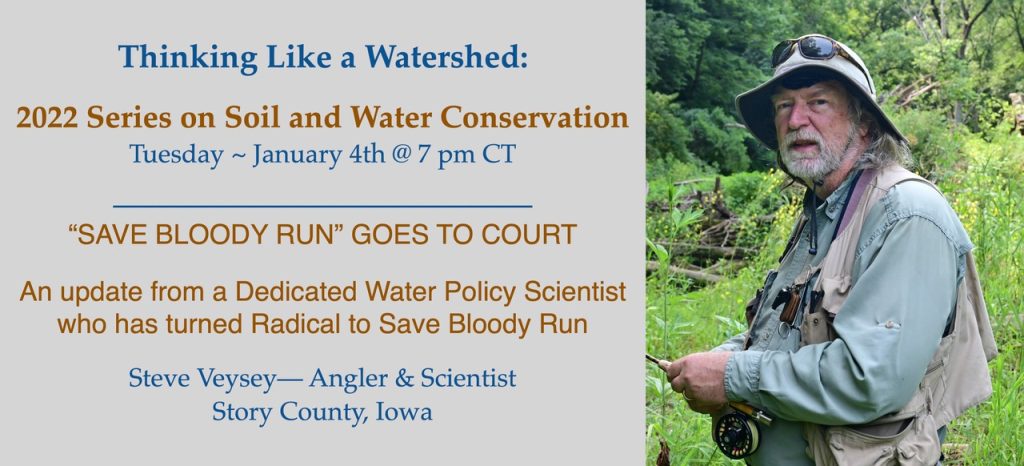
Photo by: David Thoreson
Our January program was kicked off with an update from Save Bloody Run. Where we learned the latest details from water policy scientist, Steve Veysey.“Save Bloody Run Goes to Court” Thinking Like a Watershed ~ Steve Veysey— January 4th, 2022 An update from a Dedicated Water Policy Scientist who has turned Radical to Save Bloody Run.
2021 Thinking Like a Watershed Programs—
— “Heartland Heroines” Thinking Like a Watershed ~ Robin Moore & Denise O’Brien— June 1, 2021 How two savvy conservationists empower working farm landowners to put their inner land ethic to work.
— “Planting Seeds to Grow Vibrant Communities” Thinking Like a Watershed ~ Chris Deal & Art Cullen— May 4, 2021 How Jefferson, Iowa’s Chris Deal is working with California Rep. Ro Khanna and others to grow vibrant rural communities in the Heartland with perspectives from Pulitzer Prize—winning journalist and editor of The Storm Lake Times, Art Cullen.
—“Watershed Bridges— Green to Blue”: Thinking Like a Watershed ~ Vicki Nichols Goldstein & Seth Watkins— April 6, 2021 How improving soil health and water quality in Iowa and other inland states benefit watersheds that provide critical services from land to sea.
— “Local Heroes in Howard County”: Thinking Like a Watershed ~ Neil Shaffer & Hunter Slifka— March 2, 2021 How they have incorporated several thousand acres of land under conservation programs–the largest percentage in Iowa.
—“The Accidental Conservationist”: Thinking Like a Watershed ~ Wayne Fredericks— February 2, 2021 How an Iowa Farmer is Improving Natural Capital while Increasing Profits with Conservationist and Farmer, Wayne Fredericks from Mitchell County, Iowa.
Learn more—
Izaak Walton League provides a fun educational outdoor activity for the entire family…
Learn more here!
To help celebrate the Izaak Walton Leagues’ 100th anniversary in 2022, The Des Moines Chapter is heading up an effort to expand the Izaak Walton League’s SOS (Save our Streams) program throughout Iowa. This is the only nationwide program training volunteers to protect waterways from pollution and to bring information about water quality to their communities.
The IWL’s history: At the turn of the 20th century, uncontrolled discharges of industrial waste and raw sewage, unrestricted logging, and soil erosion threatened to destroy the nation’s most productive waterways. The country’s forests, wetlands, and wilderness areas were quickly disappearing. In 1922, 54 sportsmen declared that it was “time to call a halt” to this destruction. Aware that action – not just talk – would be necessary to solve these problems, the group decided to form an organization to combat water pollution and protect the country’s woods and wildlife. As a reminder of their purpose, they named the organization after Izaak Walton, the 17th-century English angler-conservationist who wrote the literary classic The Compleat Angler.
“Defenders of Soil, Air, Woods, Waters & Wildlife”
Continue to Stay Safe and Stay Engaged…
Save our Streams—On-line training to become a certified Izaak Walton League’s Save Our Stream monitor
Click Here to learn more about Save Bloody Run
— Izaak Walton League’s Outdoor America articles on line.
—About water quality monitoring and research, check out The University of Iowa’s Chris Jones blog who has published several articles on where Iowa stands with regards to soil health and water quality.
—Wait no longer to watch, re-watch and share PFI’s full-length film, “Livestock on the Land“. Please help us get this to as many viewers as possible – farmers, eaters, citizens and policymakers.
—Iowa Farmers Union Events, check out their amazing weekly webinars…
—Iowa Environmental Council’s Event page is packed with fabulous opportunities to learn more from their organization and others.

